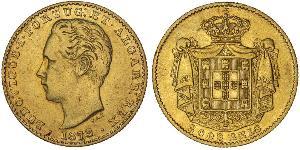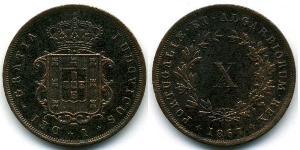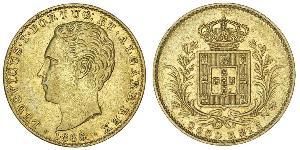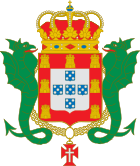|
|
This article may be expanded with text translated from the corresponding article in the Portuguese Wikipedia. (January 2012)
Click [show] on the right to read important instructions before translating.
|
| This article does not cite any references or sources. (December 2009) |
| Luís I | |||||
|---|---|---|---|---|---|
 |
|||||
| King of Portugal and the Algarves | |||||
| Reign | 11 November 1861 – 19 October 1889 |
||||
| Acclamation | 22 December 1861 | ||||
| Predecessor | Pedro V | ||||
| Successor | Carlos I | ||||
| Prime Ministers | |||||
| Spouse | Maria Pia of Savoy | ||||
| Issue | Carlos I Infante Afonso, Duke of Porto |
||||
|
|||||
| House | House of Braganza–Coburg | ||||
| Father | Ferdinand II of Portugal | ||||
| Mother | Maria II of Portugal | ||||
| Born | 31 October 1838 Lisbon, Portugal |
||||
| Died | 19 October 1889 (aged 50) Cascais, Portugal |
||||
| Burial | Pantheon of the Braganzas | ||||
| Religion | Roman Catholicism | ||||
Luís I (Portuguese pronunciation: [luˈiʃ]; English: Louis I, Full name: Luís Filipe Maria Fernando Pedro de Alcântara António Miguel Rafael Gabriel Gonzaga Xavier Francisco de Assis João Augusto Júlio Valfando de Saxe-Coburgo-Gotha e Bragança, the Popular, Port. o Popular; Lisbon, 31 October 1838 – 19 October 1889 in Cascais) was the King of Portugal and the Algarves between 1861 and 1889. He was the second son of Maria II and Ferdinand II and was created Duke of Porto and Viseu.
Luís was a cultured man who wrote vernacular poetry, but had no distinguishing gifts in the political field into which he was thrust by the deaths of his brothers Pedro V and Fernando in 1861. Luís's domestic reign was a tedious and ineffective series of transitional governments called Rotativism formed at various times by the Progressistas (Liberals) and the Regeneradores (Conservatives – the party generally favoured by King Luís, who secured their long term in office after 1881). Despite a flirtation with the Spanish succession prior to the Franco-Prussian War of 1870–71, Luís's reign was otherwise one of domestic stagnation as Portugal fell ever further behind the nations of western Europe in terms of public education, political stability, technological progress and economic prosperity. In colonial affairs, Delagoa Bay was confirmed as a Portuguese possession in 1875, whilst Belgian activities in the Congo (1880s) and a British Ultimatum in 1890 denied Portugal a land link between Portuguese Angola and Portuguese Mozambique at the peak of the Scramble for Africa.
Luís was mostly a man of the sciences, with a passion for oceanography. He invested great amounts of his fortune in funding research boats to collect specimens in the oceans of the world. He was responsible for the establishment of one of the world's first aquariums, the Aquário Vasco da Gama in Lisbon, which is still open to the public with its vast collection of maritime life forms, including a 10 meter long squid. His love for sciences and things new was passed to his two sons.
Contents
Marriages and descendants[edit]
Luís married Princess Maria Pia of Savoy, daughter of Victor Emmanuel II of Italy and Maria Adelaide of Austria. They both had a deep love at first, but Luis's countless mistresses lead Maria Pia to depression. Together they had two sons who survived childhood, and a stillborn son in 1866. The King also fathered one illegitimate child, born in 1874 in Lisbon, a son named Carlos Augusto.
| Name | Birth | Death | Notes |
|---|---|---|---|
| By Princess Maria Pia of Savoy (16 October 1847 – 5 July 1911; married on 6 October 1862) | |||
| Dom Carlos, Prince Royal of Portugal | 28 September 1863 | 1 February 1908 | Who succeeded him as Carlos I, the King of Portugal, murdered in 1908 by the Carbonária. |
| Dom Afonso, Prince Royal of Portugal | 31 July 1865 | 21 February 1920 | Infante of Portugal, Duke of Porto, Viceroy of India, and after 1908 Prince Royal. |
Titles, Honours, and Styles[edit]
| Royal styles of King Luís I of Portugal |
|
|---|---|
 |
|
| Reference style | His Most Faithful Majesty |
| Spoken style | Your Most Faithful Majesty |
| Alternative style | Sire |
Titles and Styles[edit]
- 31 October 1838 - 11 November 1861 His Highness The Duke of Porto and Viseu
- 11 November 1861 - 19 October 1889 His Most Faithful Majesty The King of Portugal and the Algarves
Luís I's official styling as King of Portugal:
By the Grace of God and by the Constitution of the Monarchy, Luís I, King of Portugal and the Algarves, of either side of the sea in Africa, Lord of Guinea and of Conquest, Navigation, and Commerce of Ethiopia, Arabia, Persia, and India, etc.
Ancestry[edit]
External links[edit]
|
|
Luís I of Portugal
Cadet branch of the
House of Saxe-Coburg and Gotha
Born: 31 October 1838 Died: 19 October 1889 |
||
| Regnal titles | ||
|---|---|---|
| Preceded by Pedro V |
King of Portugal and the Algarves 1861–1889 |
Succeeded by Carlos I |
| Portuguese royalty | ||
| Preceded by Maria II |
Duke of Porto 1838–1861 |
Succeeded by Afonso Henriques |
|
||||||||||||||||||||||||
|
||||||||||||||||||||||||||||||||||||||||||||||||||||||||||||||||||||||||||||||||||||||||||||||||||||||||||
|
|||||||||||||||||||||
|
||||||||||||||||||||||||||||||||||||||
- 1838 births
- 1889 deaths
- Portuguese monarchs
- Portuguese infantes
- Portuguese royalty
- Kohary family
- Knights of the Garter
- Knights of the Golden Fleece
- Recipients of the Royal Order of Kamehameha I
- Dukes of Porto
- 19th-century Portuguese monarchs
- Burials at the Monastery of São Vicente de Fora
- Grand Masters of the Order of the Immaculate Conception of Vila Viçosa
- Knights of the Supreme Order of the Most Holy Annunciation
- People from Lisbon
- Constables of Portugal
- Knights of the Royal Order of the Seraphim










